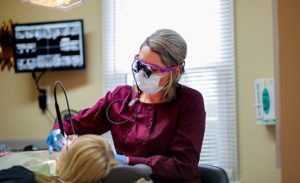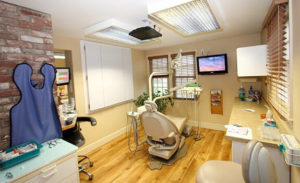HOW TO AVOID STINKY BREATH
May 30, 2023
 Bad breath is breath that has an unpleasant odor. It’s also known as halitosis. This odor can occur from time to time, or it can be long lasting, depending on the cause.
Bad breath is breath that has an unpleasant odor. It’s also known as halitosis. This odor can occur from time to time, or it can be long lasting, depending on the cause.
Millions of bacteria live in the mouth, particularly on the back of the tongue. In many people, they are the primary causes of bad breath. The mouth’s warm, moist conditions are ideal for the growth of these bacteria. Most bad breath is caused b1y something in the mouth.
Some types of bad breath are considered to be fairly normal. They usually are not health concerns. One example is “morning mouth.” This occurs because of changes in your mouth while you sleep. During the day, saliva washes away decaying food and odors. The body makes less saliva at night. Your mouth becomes dry, and dead cells stick to your tongue and to the inside of your cheeks. When bacteria use these cells for food, they produce a foul odor.
In addition, bad breath can be caused by the following:
Poor dental hygiene – Infrequent or improper brushing and flossing, allows bits of food that are stuck between the teeth to decay inside the mouth. Poor oral hygiene eventually will lead to periodontal (gum) disease, which also can cause bad breath.
Infections in the mouth – These can be caused by either a cavity in a tooth or by periodontal (gum) disease.
Respiratory tract infections – Throat, sinus or lung infections.
External source – Garlic, onions, coffee, tea, cigarette smoking, and chewing tobacco, all contribute to halitosis.
Dry mouth (xerostomia) – This can be caused by salivary gland problems, medicines or “mouth breathing.” A large number of prescriptions and over the counter medicines cause dry mouth. Xerostomia is a major contributor to bad breath and advanced dental decay.
Illnesses – Diabetes, liver disease, kidney disease, lung disease, sinus disease, reflux disease and others.
Bad breath caused by dental problems can be prevented easily with proper home and professional care. Your dentist will review your medical history for conditions that can cause bad breath and for medicines that can cause dry mouth.
Your dentist may refer you to your family physician if an illness is the most likely cause. In severe cases of gum disease, your dentist may suggest that you see a periodontist (a dentist who specializes in gum problems).
If the cause is systemic, you will need diagnostic tests to check for lung infection, diabetes, kidney disease, liver disease or Sjögren’s syndrome. The type of tests you get depends on the suspected illness. You may get blood tests, urine tests, X-rays of the chest or sinuses, or other tests.
The treatment for bad breath depends on the cause. As with all medical issues, it is best to follow regular professional maintenance appointments.
One of the best things you can do daily is scrape your tongue with a…..you guessed it……tongue scraper. Brushing the tongue is not advised as this pushes bacteria further into the tongue. A tongue scraper is designed to pull and collect millions of bacteria that accumulate on the tongue. If you don’t have one, ask your dentist for one at your next appointment.
Dr. St. Clair maintains a private dental practice in Rowley dedicated to health-centered family dentistry. He has a special interest in treating snoring, sleep apnea and TMJ problems. If there are certain topics you would like to see written about or questions you have please email them to him at jpstclair@stclairdmd.com
Why Does My Jaw Hurt in the Morning?
May 25, 2023
 Does your jaw hurt in the morning? You might attribute it to your sleeping position or another minor issue, but it can be a sign of an underlying problem. You might have a habit of grinding or clenching your teeth while you’re sleeping. Not only can this damage your teeth, but it can also cause a disorder of your temporomandibular joints (TMJ). Here’s what might be behind your jaw pain and what you can do to stop the discomfort.
Does your jaw hurt in the morning? You might attribute it to your sleeping position or another minor issue, but it can be a sign of an underlying problem. You might have a habit of grinding or clenching your teeth while you’re sleeping. Not only can this damage your teeth, but it can also cause a disorder of your temporomandibular joints (TMJ). Here’s what might be behind your jaw pain and what you can do to stop the discomfort.
(more…)
DENTAL HEALTH FOR LIFE – PART 3
May 22, 2023
 In the first segment of this series, I discussed the role of caregivers in early dental care. Prevention starts as early as 6 months into pregnancy and continues with essential steps early in a child’s life. The second segment discussed dental care for children as they develop. In this final segment I will discuss easy prevention and maintenance steps to take to help ensure dental health for a lifetime.
In the first segment of this series, I discussed the role of caregivers in early dental care. Prevention starts as early as 6 months into pregnancy and continues with essential steps early in a child’s life. The second segment discussed dental care for children as they develop. In this final segment I will discuss easy prevention and maintenance steps to take to help ensure dental health for a lifetime.
As I stated a few weeks ago, in preventive-based dental practices we go far beyond saying to patients, “you need to brush and floss more.” We truly believe that dental disease, both dental caries (cavities) and gum disease, is very preventable. However, we recognize that not every individual is equal when it comes to susceptibility. Each person presents with their own unique genetic pool, good and bad habits, number and position of teeth, and willingness to truly make a change. The one constant is that most of us have room for improvement.
Here are 4 simple things that will help maintain dental health for a lifetime:
Professional Maintenance – It is easy to put professional hygiene visits on the backburner. We are pulled in many different directions in life, and the absence of pain in our mouths sometimes grants us permission to skip regular dental appointments. Some people will use the excuse of lack of insurance for not going on a regular basis. The most important thing you can do to prevent dental disease is to commit to a lifetime of professional dental visits. This is a choice. Your cell phone costs more per year than these visits will. Some people require four visits a year to maintain health and others may only require one. There are no set rules. However, it is up to you to make the commitment.
Home Care – Most people have significant room for improvement with their home care. Coaching, in anything, increases an individual’s potential for improvement. Think of us as your dental coach. We routinely ask patients to bring their toothbrushes with them to their appointments to review technique. As simple as it sounds, constant evaluation and improvement of your home care can only decrease your chances of dental disease.
Diet – What we put in our mouths, when we do it and how often are all choices as well. As with everything, some people can get away with things that others cannot. Decay rates are different for different people and can change during the course of a lifetime. This is an important topic to routinely discuss at regular visits.
Dental Orthotics – This is in reference to any oral appliance, typically worn while sleeping, but there are some worn during the day. This is another situation where absence of any symptoms sometimes allows us to ignore what is really going on. It is easy to get someone to wear an appliance in their mouth if they present with TMJ issues or headaches. On the other hand, it is often difficult to convince someone to routinely wear a nighttime appliance if they have no symptoms. For example, people who have had braces should be wearing retainers. People who have sleep apnea may have the option of wearing an oral appliance. However, those who have evidence of clenching and/or grinding are the most undertreated. It is my firm belief that if more people committed to unfailing routine use of a properly made nighttime appliance (if they show any indications they need it), many potential dental problems would be avoided.
I believe that most dental disease is preventable. What it takes to prevent dental disease in one person may very well not be the same for another. Choose and commit to these four things and you are guaranteed fewer dental problems over your lifetime.
Dr. St. Clair maintains a private dental practice in Rowley dedicated to health-centered family dentistry. He has a special interest in treating snoring, sleep apnea and TMJ problems. If there are certain topics you would like to see written about or questions you have please email them to him at jpstclair@stclairdmd.com
DENTAL HEALTH FOR LIFE – PART 2
May 15, 2023
 Last week I talked about oral care for mothers-to-be and babies. Preventive care truly does start before birth. This week we journey past those early years of life.
Last week I talked about oral care for mothers-to-be and babies. Preventive care truly does start before birth. This week we journey past those early years of life.
In preventive-based dental practices we go far beyond saying to patients, “you need to brush and floss more.” We truly believe that dental disease, both dental caries (cavities) and gum disease, is very preventable. However, we recognize that not every individual is equal when it comes to susceptibility. Each person presents with their own unique genetic pool, good and bad habits, number and position of teeth, and willingness to truly make a change. The one constant is that most of us have room for improvement.
It goes without saying that preventive care includes regular visits to the dentist. Based on my experience, even many of those who visit the dentist on a regular basis have significant room for improvement. However, it is up to your caregivers, hygienists and dentists, to have that preventive frame of mind to go beyond just telling you to brush and floss more.
Technique is vital when it comes to home care. Although daily removal of plaque (the thin, sticky film of bacteria that creates cavities and gum disease) can be accomplished with a manual toothbrush, the proper power toothbrush is more appropriate and effective for most people. We routinely ask patients to bring their toothbrushes with them to their appointments to review technique. The same goes for the water pik. Think of your dentist and/or hygienist as your dental coach. Coaching, in anything, increases an individual’s potential for improvement.
The same approach goes for kids. Although we do the same thing with children, they need that additional coaching from home. The best way to guide your family to good oral health is to lead by example. Parents should supervise toothbrushing by children younger than age 8 to make sure they are doing a thorough job. This also goes for flossing. This is done until the child is consistently getting good homecare reports at dental visits.
The challenge of good home care increases with the addition of braces. Children and adults in braces need extra coaching on technique and more time spent on their daily routine. I am a firm believer that preventive visits to the dentist should increase during orthodontics. There is too much at risk during this time and the extra professional care and coaching are vital to escaping the pitfalls of poor homecare while braces are on.
As life goes on, your genetic make-up, the amount of professional care and coaching you receive, your effectiveness at home, and your willingness and ability to improve, will shape your oral health. The fact of the matter is, there are those who need more professional care and more rigorous homecare than others.
As I stated earlier, I believe that most dental disease is preventable. What it takes to prevent dental disease in one person may very well not be the same for another. Between finding the right fit with a dental office, utilizing the coaching expertise of those individuals, using the right homecare products, and always striving to improve, excellent oral health for a lifetime is possible.
In the final segment of this series next week, I will discuss some simple ideas to maintain good dental health for your entire adult life. It is simpler than you think.
Dr. St. Clair maintains a private dental practice in Rowley dedicated to health-centered family dentistry. He has a special interest in treating snoring, sleep apnea and TMJ problems. If there are certain topics you would like to see written about or questions you have please email them to him at jpstclair@stclairdmd.com
DENTAL HEALTH FOR LIFE – PART 1
May 1, 2023
 Research shows that babies are born without any harmful bacteria in their mouths. However, once bacteria colonize in the mouth, children are more prone to cavities in their baby teeth and permanent teeth. How do they get the bacteria? Caregivers.
Research shows that babies are born without any harmful bacteria in their mouths. However, once bacteria colonize in the mouth, children are more prone to cavities in their baby teeth and permanent teeth. How do they get the bacteria? Caregivers.
Most parents don’t know that they can pass harmful bacteria from their mouth to their baby’s mouth. The most critical time is during the child’s first 2 ½ years of life. Most children are born without a single tooth. Can bacteria passed to children without teeth affect their decay potential for their whole life? According to research the answer is yes.
Here’s a shocker…..If you have a history of poor oral health, including many fillings in your mouth, you are much more likely to transfer these harmful bacteria to children. How? Typically, this takes place through common parental or caregiver behaviors such as sharing utensils or cleaning a baby’s pacifier with your own saliva.
Prevention starts as early as 6 months into a pregnancy. Research shows that expectant mothers who chewed gum containing the sweetener xylitol are much less likely to have decay-causing bacteria in their saliva. So, take-home point number one, it is essential for expectant parents and caregivers to keep their own mouths healthy. If you reduce the bacterial levels in your own mouth, you are not only benefiting yourself but also that of your unborn child. Visiting a dentist regularly, even more often when you are pregnant, improving your homecare, and using products that specifically reduce bacteria are all essential.
Your baby is born; now what? First, eliminate potential ways of transferring saliva to your baby. Do not share utensils or let grandma or grandpa lick a cloth to clean around a baby’s mouth. Wiping your baby’s gums with a clean cloth after meals is also good practice to help reduce bacterial levels.
Once a child starts getting teeth, diet plays a significantly greater role. Minimizing snacks and drinks with fermentable sugars is key. This starts with the bottle. Bottle syndrome, also known as baby bottle tooth decay, occurs when teeth become exposed, at length and frequently, to liquids containing a form of sugar. All liquids that contain sugar can cause bottle syndrome, including breast and cow’s milk (which contain the sugar lactose), formula, fruit juice (which contains the sugar fructose), soda and other sweetened drinks. It is caused by the constant presence of milk, formula, or fruit juice in a child’s mouth during the night, during breastfeeding, during naps, or for extended periods during the day. The liquid pools around the teeth and gums, providing food for the bacteria in plaque. The bacteria produce acid as a byproduct when they consume the sugar. This acid attacks your child’s teeth and causes decay.
When your child feels comfortable with a toothbrush, brush their teeth and gums twice a day with an extra-soft toothbrush. Use a pea-sized amount of toothpaste without fluoride until your child is old enough to spit. If your child doesn’t like toothpaste, it’s fine to brush without it.
Prevention starts before babies are born. It starts with taking care of your own mouth.
Next week, in the second part of this 3-part series, we will explore some important issues to consider during the next phase of life.
Dr. St. Clair maintains a private dental practice in Rowley dedicated to health-centered family dentistry. He has a special interest in treating snoring, sleep apnea and TMJ problems. If there are certain topics you would like to see written about or questions you have please email them to him at jpstclair@stclairdmd.com







